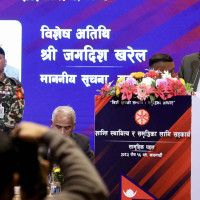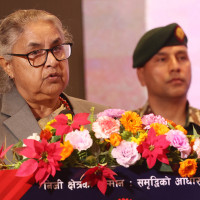- Thursday, 1 January 2026
Widen Humanitarian Health Research
We live in times of rapid change, facing urgent and complex challenges from climate change to accelerating uncertainty. While many countries are part of the global development challenges, actionable and positive changes are needed to demonstrate a significant social transformations in the lives of people who are socially excluded and marginalised within and across cultures.
Despite uncertainties of Anthropocene, it is interesting to explore how communities cope with rapid environmental and social changes, maintain adaptive mechanisms and sustain their lives in search of securing resilient future. Central to this debate is the idea of social resilience and adaptive wisdoms facilitating pathways for transformative actions for sustainable human development.
Health research
In the recent years, significance of humanitarian health research is gaining momentum. In essence, it broadly includes health research with people and their communities who are directly affected by unfortunate humanitarian crisis. Such crisis understandably disrupts and threatens people’s livelihoods at scale. Therefore, humanitarian health research aims to further explore intersecting and differential effects of humanitarian crisis on health systems or communities in specific socio-cultural and political contexts.
Besides, there are critical needs to explore how public authority, institutions and politics shape humanitarian health needs and development. Of course, it is also vital to understand how the governments can effectively provide social protection services to poor and marginalised populations during humanitarian crisis. The larger context of social systems can be harnessed to support people everywhere to lead healthier, well-nourished and more fulfilling lives.
Again, apart from forced displacement and migration, the natural hazards and disasters such as extreme weather events, earthquakes, rainfalls, floods, and droughts may cause epidemics, and disease outbreaks having profound impacts on human and environmental health. Therefore, conducting health research in the humanitarian context is a challenging task. However, some of the pertinent issues for health researchers are disrupted health systems, socio-cultural sensitivities, political tensions, safety and security concerns.
In a rapidly changing world, the climatic and environmental changes are brought by the visible forces of industrialisation, urbanisation, capitalism and global development. Considering these realities, the emerging concepts of One Health, Planetary Health, and Eco-health largely focus on the intricate relationships between human health and environment. Thus, the entanglements between climatic environment and changing health practices can be relevant agenda for policy makers, researchers, and anthropologists working in humanitarian health research within and across societies.
On the other hand, the compounding effects of climate change and environmental degradation are more serious across Asia. In some part of the region, people are facing devastating floods, unprecedented rainfall, deadly heatwaves and glacier melt. Evidence suggests that these unfortunate events are shaped by social, cultural, economic and political structures. However, the political economy and social inequalities in such disasters and health emergencies are largely perceived as people’s embodied experiences that need closer attention for environmental justice.
Additionally, political ecology has been instrumental in exploring and addressing power dynamics and structural barriers that have been perpetuating environmental inequalities. Undoubtedly, the deeply entrenched inequalities within and across cultures are leading to social and economic injustices. Nurturing the culture of humanitarian health research can build social cohesion, identify new ways of working to tackle intersecting social, cultural, economic and political inequalities in accessing basic health care across societies.
As a matter of fact, the extraction and consumption of natural resources have tremendous implications in terms of how people are responding to societal and environmental changes. The social forces also create unequal power relations and conflicts over natural resources. Respecting inclusion, equity, diversity, transparency and social justice are critical in reducing impacts of socio-environmental changes within and across societies.
The diverse challenges experienced by globalised and inequitable health systems need to be realistically faced. With transformational learning and actions, we can address social, cultural, economic and political exclusion experienced by social groups such as ethnic and indigenous communities, people with disabilities, sexual and ethnic minorities, migrants and displaced populations, and many others. Such an inclusive approach can provide an important basis for more evidence-informed polices and strategic actions.
The human experience of illness, health, and well-being is profoundly influenced by social, cultural, political, economic, and ecological systems. Medical anthropologists study traditional healing practices to have a better understanding of people’s embodied experiences of health and illness within and across cultures. Moreover, it is essential to explore how social inequality is reflected in environments and infrastructures that shape different health outcomes.
In summary, the public health in humanitarian context addresses health issues of people affected by disasters, health emergencies, conflicts or other environmental injustice. In the context of humanitarian development nexus, it is crucial to explore differential effects of such disasters on people in their everyday life. Conducting humanitarian health research helps explore and apply evidence-based strategies for prevention, preparedness, response, recovery and reintegration. Enhancing the capability of governments, partners, civil society, business sector, development practitioners and academia is crucial to build the new skills and knowledge for equitable and resilient health for all.
Largely, some of the priority humanitarian health areas are communicable and non-communicable disease control, water, sanitation and hygiene, nutrition, sexual and reproductive health, gender-based violence, mental health, physical rehabilitation and health systems. Moving forward, Nepal Health Research Council (NHRC), Tribhuvan University (TU) and other research institutes need to adequately educate and train scholars, researchers, practitioners, governments and other relevant organisations on the latest concepts, theories, good practices, and approaches of humanitarian health science to facilitate evidence-based policies and strategic actions at all levels.
(Bhandari is a health policy analyst.)














